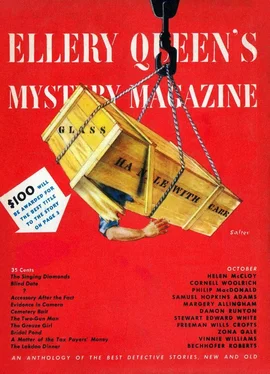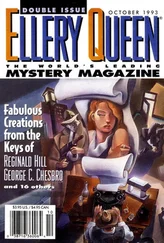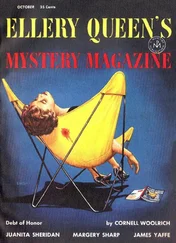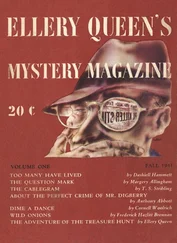Марджери Аллингем - Ellery Queen’s Mystery Magazine. Vol. 14, No. 71, October 1949
Здесь есть возможность читать онлайн «Марджери Аллингем - Ellery Queen’s Mystery Magazine. Vol. 14, No. 71, October 1949» весь текст электронной книги совершенно бесплатно (целиком полную версию без сокращений). В некоторых случаях можно слушать аудио, скачать через торрент в формате fb2 и присутствует краткое содержание. Город: New York, Год выпуска: 1949, Издательство: The American Mercury, Жанр: Классический детектив, на английском языке. Описание произведения, (предисловие) а так же отзывы посетителей доступны на портале библиотеки ЛибКат.
- Название:Ellery Queen’s Mystery Magazine. Vol. 14, No. 71, October 1949
- Автор:
- Издательство:The American Mercury
- Жанр:
- Год:1949
- Город:New York
- ISBN:нет данных
- Рейтинг книги:5 / 5. Голосов: 1
-
Избранное:Добавить в избранное
- Отзывы:
-
Ваша оценка:
- 100
- 1
- 2
- 3
- 4
- 5
Ellery Queen’s Mystery Magazine. Vol. 14, No. 71, October 1949: краткое содержание, описание и аннотация
Предлагаем к чтению аннотацию, описание, краткое содержание или предисловие (зависит от того, что написал сам автор книги «Ellery Queen’s Mystery Magazine. Vol. 14, No. 71, October 1949»). Если вы не нашли необходимую информацию о книге — напишите в комментариях, мы постараемся отыскать её.
Ellery Queen’s Mystery Magazine. Vol. 14, No. 71, October 1949 — читать онлайн бесплатно полную книгу (весь текст) целиком
Ниже представлен текст книги, разбитый по страницам. Система сохранения места последней прочитанной страницы, позволяет с удобством читать онлайн бесплатно книгу «Ellery Queen’s Mystery Magazine. Vol. 14, No. 71, October 1949», без необходимости каждый раз заново искать на чём Вы остановились. Поставьте закладку, и сможете в любой момент перейти на страницу, на которой закончили чтение.
Интервал:
Закладка:
“Minnie—”
“Just a second. There’s something else. The record said she was a pretty constant snuff dipper. She told one visitor that outside of church, snuff was her one pleasure in life. Well, she didn’t use it today, and what’s more, she hasn’t for several days. There weren’t any stains on her lips or fingers.”
“I gather you’re saying she needs money, and that she’s sold the chickens and broach.”
“Uh-huh, but I made a final check to be sure. I just phoned her preacher. She’s an Adventist, you know, and those folks believe in tithing one-tenth of their income to the church. Well, Preacher Davis says Mrs. Smith hasn’t been to church — or tithed — in a month.”
“Minnie — now hold your horses. You’re about to get me all worked up. So she needs money. Well, she’s not the first client who did — so what are you getting so tense about?”
Miss Minnie rubbed her smarting eyes, said slowly, “I think the old lady’s in trouble. That’s why I thought I’d take a run out to Jut’s tonight.”
“Minnie, that’s not necessary! You can just as well wait until next week.”
“I don’t think so. You know that anonymous letter we got?”
“What about it?”
“Did you notice the handwriting? Mrs. Smith wrote it herself.”
Jut’s Place was on the Tamiami Trail, a few miles south of town. It was about seven o’clock, still light, when Miss Minnie nosed her sedan to a stop in the parking lot, between a mule cart and a 1929 Dodge.
Friday night was Mango county’s night to howl. There were already a sprinkle of cars in the lot, and several horses stood patient and dusty by the hitching rail. A red neon sign flashed on the roof, and Bad Blood Blues blared from the jook organ.
Miss Minnie paused at the hitching rail to pat a familiar black and white pinto. “Hi, feller, Jimmie Bee here already?”
The pinto whinnied, and Miss Minnie went on in.
The jook was a square, clapboard building with high naked rafters, dimly lit. Most of it was given over to tables and booths surrounding a railed-in dance floor and a blaring jook organ. Off to one side was a small, dim bar. Miss Minnie, gray-haired and respectably shabby, headed for it.
The tall lantern-jawed cracker behind the bar looked up as she entered. There was a black stubble on his chin and a matching black rim under his nails. His small bloodshot eyes widened, then narrowed.
“Well, Miss Minnie, I ain’t seen you in a coon’s age,” he said in a high nasal voice, sidling forward. “Where you been?”
Miss Minnie laid her worn purse on the bar, said dryly: “Now don’t go making out I’m a customer of this snake-hole of yours, Jut.”
A downy-faced young cowboy down the bar leaned forward, his thin.face a-grin under a half-bushel pumpkin hat.
“Hi, Miss Minnie, you taking to jooking?”
“You keep a soft tongue in your head, Jimmie Bee... I saw your pinto outside.”
The young cowboy said proudly, “Purtiest hoss in the county.”
Jut moved restively. “Now, Miss Minnie, I wasn’t throwing off on you. I was jes cur’ous how come you was here.”
Miss Minnie ignored him, looking at the waitresses scurrying across the dance floor, serving customers. She spotted a new face.
“I see you got yourself a new ‘niece,’ Jut.”
The jook man’s face was sullen. He laid huge knobby hands on the bar, powerful veined hands that were out of keeping with his pale gauntness.
“Now, listen, Miss Minnie, you ain’t got nothing on me concerning Belle. She’s her own woman, full-growed, with a kid. If you’re figuring on raising sand—”
“I’m not figuring on raising anything. Give me a coke, then call her over.”
The man hesitated, then slowly got a bottled coke out of the ice chest, opened it, and slid it forward. His eyes slid furtively to Miss Minnie’s placid sun-burned face, slid away. He raised his voice over the blare of the jook organ.
“Belle! Hey, Belle, c’m in here, will you?”
The blonde girl turned from a booth and leisurely sauntered into the bar, balancing a tray of empty bottles and glasses on her shoulder. She was in her early thirties, hard lines around her mouth, her hair platinum-blonde, a spit curl on one temple. Her skin was dark, and there were brown stains under her black eyes.
“What you want, Jut?”
Jut jerked his head. “Miss Minnie Boyd from the Welfare Office. She wanted to meet you.”
The woman stared at Miss Minnie, slammed her tray on the bar. She swung back, glaring, a hand on her hip. “Now, listen, you nosy busybody, if it’s about the kid, I’ll have you know she’s going to school every day and—”
Miss Minnie said equably, “It’s not. Do you know a Mrs. Annie Smith?”
The girl hesitated, said warily, “I’ve met her.”
Miss Minnie said mendaciously, “She says she’s making some dresses for you. I just wanted to check on it.”
The girl stared and burst into harsh laughter. “Sure, she’s making some dresses for me. Seeing as how I ain’t been able to get to Maas Brothers lately, she’s been whipping me up a coupla bungalow aprons. So what?”
Miss Minnie smiled. “Why, nothing. Thanks.”
The girl hesitated, a line between her thin black brows. Jut leaned forward.
“Belle, there’s one of them cowboys heading this way, wanting to ask you to dance.”
The girl cursed briefly, “Those cowboys and their high heels—” She plunged through a curtained doorway behind the bar.
The cowboy, a hulking youth in dusty jeans, with the slack wet-lipped appearance of one who has drunk too many whiskeys with lemon-pop chasers, halted and made his slow way back to the dance floor.
Jut leaned forward grinning. “Belle just purely hates dancing with cowboys. She—” He broke off, glaring at the corner of the bar. “Bessie, what you doing down here? Ain’t your Ma and me told you to stay upstairs? You march yourself right back up, you hear?”
Miss Minnie turned. A small girl was standing at the corner of the bar, a grave-eyed child of about seven, her black hair skinned back in two pigtails, thin shoulders erect and sturdy in a too-small dress.
Her voice came in a grave treble. “I got lonesome. I heard the music—”
“Ne’ mind that! You git!”
The child turned and mounted the flight of stairs behind the bar which led, Miss Minnie knew, to some shabby rooms upstairs.
She turned her eyes to Jut. “Belle’s child?”
“Yeah.”
The jook was filling up rapidly, the screen door slamming as new couples came in. A solitary cowboy entered the bar. He resembled a dozen others: the slightly bowed shoulders, the faded dungarees tucked into high-heeled boots, the shambling gait. His face was hidden in the shadow of the wide-brimmed black slouch hat pulled low over his eyes.
He mounted a stool in the shadows at the end of the bar, tucking gloves into his belt. He beckoned Jut, muttered:
“Scotch and water.”
Jut nodded and poured him a drink from a dusty bottle. Miss Minnie glanced at the strong hands matted with black hair, the thick jaw half-turned from her. Black hair curled from under the hat in back.
Miss Minnie got up. Jut came forward.
“On the house, Miss Minnie.”
Miss Minnie said dryly, “Thanks, I’ll pay.” She put a nickel on the bar, gestured. “Who’s the new cowpoke?”
Jut shrugged. “Calls hisself Arcadia. Reckon he’s from down that way.”
The curtained doorway rippled, and Belle reappeared. She seemed to have regained her good humor. She was smiling a little and humming a song. Her black eyes fell on the cowboy, and she stopped abruptly.
“Well,” she said shrilly. “It’s high time you got here. Where you been? You know the joint gets crowded this late. Look, I got some more dough—”
Читать дальшеИнтервал:
Закладка:
Похожие книги на «Ellery Queen’s Mystery Magazine. Vol. 14, No. 71, October 1949»
Представляем Вашему вниманию похожие книги на «Ellery Queen’s Mystery Magazine. Vol. 14, No. 71, October 1949» списком для выбора. Мы отобрали схожую по названию и смыслу литературу в надежде предоставить читателям больше вариантов отыскать новые, интересные, ещё непрочитанные произведения.
Обсуждение, отзывы о книге «Ellery Queen’s Mystery Magazine. Vol. 14, No. 71, October 1949» и просто собственные мнения читателей. Оставьте ваши комментарии, напишите, что Вы думаете о произведении, его смысле или главных героях. Укажите что конкретно понравилось, а что нет, и почему Вы так считаете.












